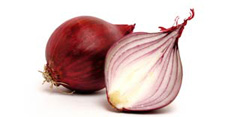Benefits Of Onions

Onions are one of the most popular flavors around the world and the health benefits of onions are numerous. Onions and garlic are in the same family, but, while lots of people know that garlic is good for you, not as many are aware of the positive benefits of onions. Onions actually were given their name to differentiate them from garlic. The word, onion, comes from a Latin word, unio, meaning one. Onions only produce one bulb while garlic produces numerous bulbs.
Both onions and garlic are members of the allium family, and contain sulfur compounds. It is exactly these compounds which give onions their fierce aroma and also most of their nutrients. One of these substances in onions is allyl propyl disulphide. They also contain lots of chromium, which makes lowering blood sugar levels one of the most well-known benefits of onions.
Diabetics can find onions to be a convenient way of lowering blood glucose levels. This happens in two ways. First, the presence of allyl propyl disulphide increases the amount of insulin available by occupying places in the liver where the body’s own insulin has not been active. And, because onions do concurrently contain chromium, the cells are able to use more effectively the insulin that is there. Many diabetics take medications that were developed to do exactly these two things.
In tests, the participants who had eaten the most onions had the lowest glucose levels. They also had higher levels of good cholesterol with an actual decrease in the overall amount of cholesterol. You can take in 20% of your daily recommended intake of chromium in one cup of onions. This can make for a more exciting and flavorful way to get your chromium than by taking a supplement. Onions can increase the zest in any dish and are especially popular on pizza, burgers and subs.
The benefits of onions rival those of garlic when it comes to lowering cholesterol levels and blood pressure. Studies show that onions can help prevent heart disease among diabetics, as well as everyone’s risk of heart attack and stroke. It is the sulfur and chromium, along with vitamin B6 that is credited with these results. In addition, vitamin B6 decreases the level of homocysteine in the blood, considered to be a risk factor in cardiovascular disease.
Onions contain one of the most talked-about antioxidants, quercetin, a flavonoid which in studies has helped protect against colon cancer. This substance is also found in red wine and green tea. When combined with tumeric, onions also helped to dramatically reduce the number of polyps in patients with intestinal cancer.
In a European study, the benefits of consuming onions included a risk reduction in developing several different types of cancer. The risk for colorectal cancer was reduced by as much as 56%, esophageal cancer 88%, laryngeal cancer 83%, breast cancer 25% and ovarian cancer 73%. Participants who ate garlic instead of onions had a reduced risk of several forms of cancer as well, but at lower percentages.
If all of these positive benefits of onions have still not convinced you to add more onions to your diet, let’s take a look at one more plus on the side of onions. In other research, onions were found to have both anti-inflammatory and anti-bacterial substances. In addition to vitamin C and quercitin, onions have other active chemicals, known as isothiocyanates. These can help reduce the inflammation that is present in asthma, osteo- and rheumatoid arthritis. They inhibit the chemicals in the body from which swelling develops. This is particularly good news for people who suffer from the pain that comes with inflammation.